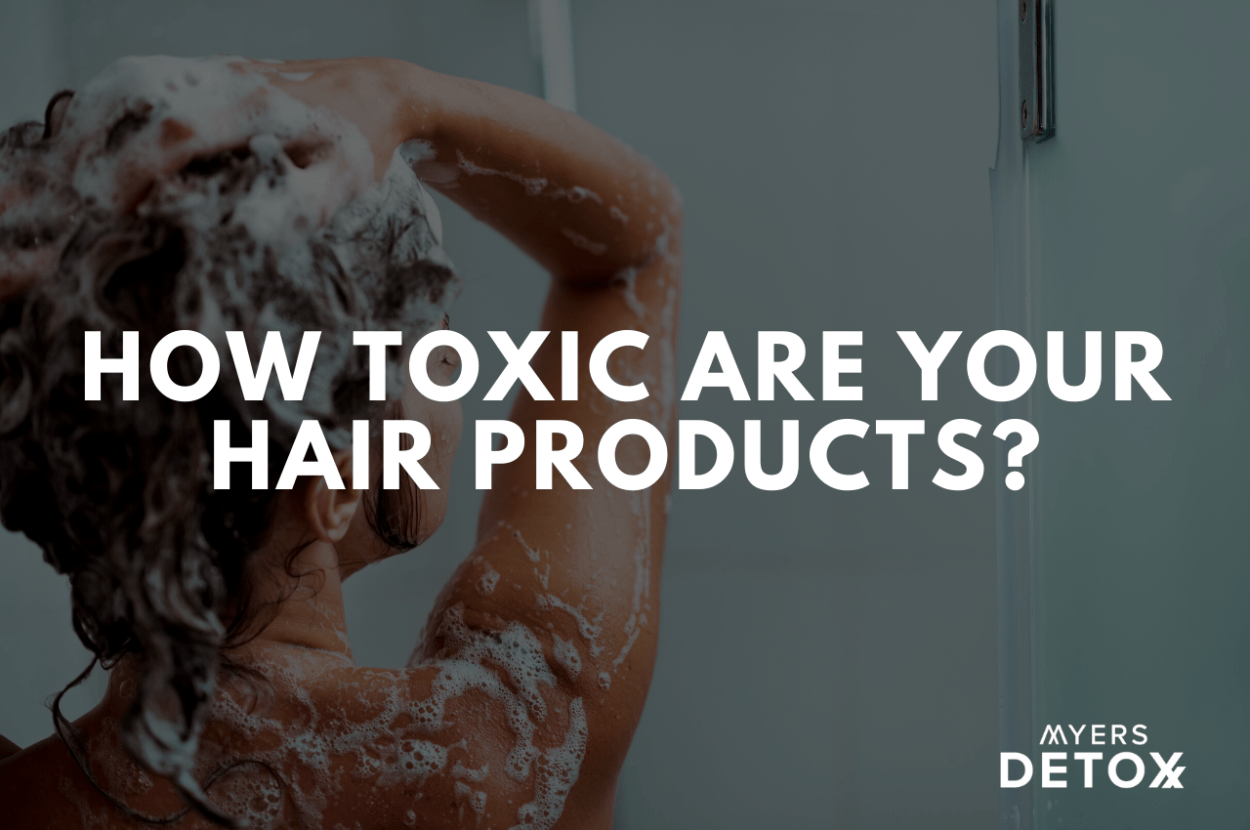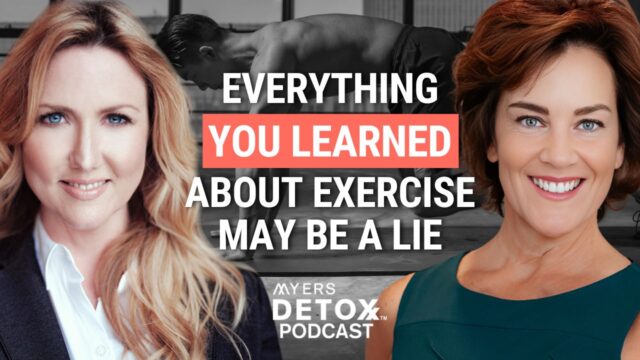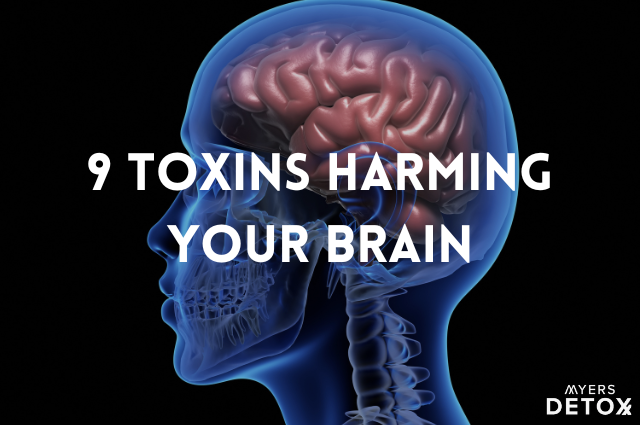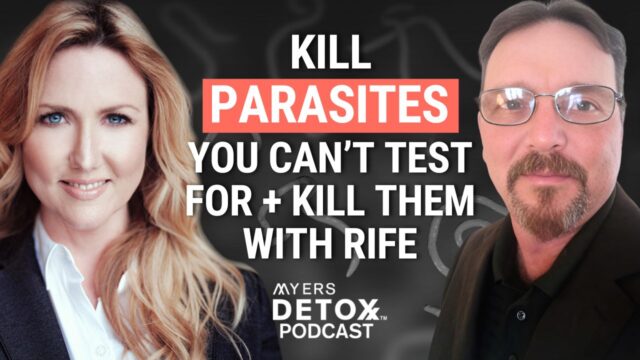When’s the last time you checked the ingredient label on your hair care products? Being vigilant about what goes on your body (head and all), is crucial if you’re trying to avoid unwanted chemical exposure.
How damaging could you shampoo, conditioner, hair gel, and hair dye actually be?
To help you out, I have put together a large selection of my absolute favorite natural hair care products. These brands that are producing products with clean ingredients that actually work!
Read on to learn more.
In this article, you’ll learn:
- How your hair products can lead to chemical exposure
- The detrimental effects of the chemicals in your hair products
- Which chemicals to watch out for
- Natural ingredient alternatives
- My hair care recommendations
Hair Care and Chemical Exposure
Many people gloss over the importance of natural hair products. They love their lathering shampoo or won’t stop dying their hair. I get it. We all pick our poisons in the name of beauty.
Most shampoos and conditioners are riddled with toxic chemicals that have very harmful, cumulative effects on your health [1]. Even more disturbing are the carcinogens lurking in products like chemical straighteners and hair dyes[2].
Truly, the haircare industry is just as problematic as the skincare industry when it comes to harmful chemicals in your products. And if you think your scalp isn’t soaking up those chemicals, think again. Your skin soaks up chemicals very readily, which go straight into your bloodstream.
Detrimental Effects of the Chemicals in Your Hair Products
- Skin sensitivities
- Cancer
- Organ system toxicity
- Mutagenicity (genetic alterations)
- Endocrine disruption
- Thyroid dysfunction
- Respiratory problems
- Developmental and reproductive toxicity
- Excitotoxicity (cell stimulation and death)
- Allergic reactions
Chemicals In Your Hair Products
Sodium Lauryl Sulfate
Sodium lauryl sulfate (SLS) is the primary toxic compound found in most conventional shampoos as it creates the foamy, sudsy consistency of the shampoo. SLS undergoes a process called ethoxylation which leaves behind trace amounts of carcinogens.
The risk for cancer is the primary reason that these ingredients can be of concern in your personal care products, with breast cancer being of particular concern[3].
SLS and other ethoxylated ingredients can be found in shampoo and hair relaxers, and are labeled as PPG, PEG, polysorbate, and ingredients that end in -eth such as laureth, steareth, and ceteareth.
Nanoparticles
Nanoparticles can be found in a wide range of personal care products, and are typically used as UV filters to block out sunlight (nanozinc) or as preservatives. In the hair product category, they’re often lurking in your shampoos.
Nanoparticles are engineered to be about 1/8000 the width of a human hair (very tiny), which give them unique properties to exhibit behaviors that affect physical, chemical, and biological behavior in your body.
The concern around nanoparticles is that their small size allows them to be more toxic than similar chemicals of a larger size — potentially crossing your blood-brain barrier[4]. These are shown to be carcinogenic and interfering in many cell functions as they are small enough to get inside cells to wreak havoc.
Nitrosamines
Nitrosamines are actually impurities created by chemical reactions, not intentional ingredients, so they don’t need to be listed on your products ingredients list. However, you can still watch out for them because they’re often found in personal care products that contain diethanolamine (DEA) and triethanolamine (TEA).
These chemical byproducts can be found in nearly every kind of personal care product, and the levels may increase over time once the product is opened. Health concerns associated with these toxic chemicals include cancer, endocrine disruption, and organ system toxicity[5].
P-Phenylenediamine
P-phenylenediamine is found in hair dyes, and when it reacts with hydrogen can alter the genetic material of your cells. The EU and Canada restrict the use of p-phenylenediamine due to its association with skin sensitivities, cancer, organ system toxicity, and mutagenicity (causing genetic alterations)[6].
Resorcinol
Resorcinol is a compound that’s primarily used in the rubber industry, but can also be found lurking in some hair care products like shampoo and hair dyes. While this compound is restricted in all types of cosmetic and personal care items in Japan, it can still be found in products in the United States.
Some concerns with resorcinol include organ system toxicity, respiratory problems, and endocrine disruption — particularly thyroid dysfunction[7].
Benzophenone
Benzophenone and its related products can be found in a wide array of personal care products, including shampoo, conditioners, and hair spray. This compound protects against UV light, making it a potential ingredient in your anti-aging products as well.
Some health concerns related to benzophenone include cancer, endocrine disruption, organ system toxicity, developmental and reproductive toxicity, organ system toxicity, and excitotoxicity[8].
Formaldehyde
Formaldehyde and formaldehyde-releasing preservatives are used in a wide range of personal care products, including hair straightening products. Manufacturers add these chemicals to water-based products to prevent microbes from growing, including shampoos and liquid baby soaps.
Formaldehyde can be absorbed through your skin and has been linked to cancer, allergic reactions, and skin irritation. This ingredient is banned in both Japan and Sweden and is restricted for use in the EU[9].
Fragrance
Fragrances are often used in personal care products, not for their functional purposes, but to either mask the scent of other chemical ingredients or to give your shampoos a more pleasant smell. The issue with fragrances is that this word is a catch-all term for over 3,000 different chemical compounds, so you never really know what you’re getting.
Some fragrances are linked to cancer, allergies and sensitivities, endocrine disruption, and reproductive toxicity. In a 2016 survey, researchers found that 99.1% of US residents are likely exposed to chemical fragrances at least once a week.
Since current public laws don’t require any transparency around which compounds are being used for fragrance, it’s best to avoid any products that add fragrance unless they come from natural sources[10].
Hydroquinone
Hydroquinone is most commonly found in hair care products as an ingredient in hair conditioners. This is another compound that’s been banned in the EU but persists in products manufactured in the US. Health concerns related to hydroquinone include respiratory tract irritation, cancer, and organ toxicity.
You may also be exposed to hydroquinone as a byproduct of synthetic vitamin E. While natural vitamin E is an excellent antioxidant, the synthetic version should be avoided[11].
My Top Non-Toxic Hair Care Recommendations
Finding the right hair care products to suit your needs is crucial. This is especially true if you have hair that doesn’t like to behave all the time (frizzy, curly, color-treated). The problem is, many of the well-known companies out there that can get your hair under control are absolutely loaded with chemicals — why do you think they work so well
In my search for the best of both worlds, I’ve come across a few brands that are producing products with clean ingredients that actually work.
Wellnesse Wellness Mama
Wellnesse was created by my friend, creator, wife, mom of six, and the mastermind behind hundreds of non-toxic, DIY recipes from her blog Wellness Mama, Katie Wells.
Together with experts in product formulation, Katie created these hair care products that are GMO-free, paraben-free, sulfate-free, and highly effective.
- Wellnesse shampoo and conditioner for all hair types – These gently clarifying and enriching formulas won’t just leave your hair feeling clean, but also deeply nourished. Nettle leaf extract supports growth and prevents breakage, while keratin and quinoa smooth and condition. That means strength and softnes
- Wellnesse shampoo and conditioner for wavy and curly hair – This smoothing formula that locks in hydration and tames wayward strands. With chamomile and rice extract, along with keratin amino acids, this is the perfect duo to help moisturize and enhance curl retention
- Wellnesse dry shampoo – This blend uses natural kaolin clay and volume-boosting tapioca to refresh hair from root to tip. Hibiscus and cactus flower work to provide moisture and even promote healthy hair growth.
Beautycounter
I am a big fan of BeautyCounter’s citrus mimosa-scented Daily Shampoo and Daily Conditioner. I love the citrus scent and they left my hair feeling strong and shiny!
Primal Life Organics
Primal Life Organics has a great shampoo bar that is a shampoo and conditioner in one! It has all-natural, protective emollients like organic oils of palm, coconut oil, olive oil, and shea butter, so it won’t dry out your scalp or strip your hair of its natural oils. And of course, it’s free of chemicals, sulfates, silicone, and parabens so it is safe for your overall health!
Griffin Remedy
Griffin Remedy has a full range of all-natural body and hair care products that are formulated with vitamins, botanicals, and essential oils. All of their products are vegan and 100% paraben-free with no artificial colors or fragrances.
I’m a huge fan of their shampoo; they have a great selection — restorative, volumizing, glossing, stimulating, and scalp therapy. They also have some fantastic shower gels with natural scents like orange blossom, lemon verbena, and lavender.
Aubrey Organics
Aubrey Organics has been around since 1967, crafting pure and natural formulas with 75% organic ingredients. All of their products are free of parabens, phthalates, silicones, and artificial fragrances.
They have a very medicinal, herb-forward smell, which I love, and they work great. My personal favorite is the calaguala fern shampoo that’s based on an ancient Mayan recipe. It’s super soothing and helps to remove any excess oils that can build up.
My biggest complaint with a lot of natural shampoos is they don’t really strip the hair – sometimes you need that. The Calaguala Fern Shampoo is a great clarifying shampoo.
Avalon Organics
Avalon Organics is another hair brand that I really love. These are plant-based shampoos and conditioners formulated with organic botanicals and essential oils. They smell great and leave your hair nourished.
My favorite is the Smooth Shine Apple Cider Vinegar Shampoo, Conditioner, and Finishing Rinse . This is a great line of clarifying products if your hair is feeling weighed down with product buildup.
Acure Organics
Acure Organics is best known for its hair care line, but they also offer face and body care products. They pride themselves on sourcing only the highest quality ingredients, and are always free of parabens, sulfates, formaldehyde, paraffin and mineral oils.
Their Moroccan argan oil and argan stem cell shampoo is fantastic for dry or damaged hair.
100% Pure
Any of these conditioners are great. They are organic and sulfate-free:
- 100% PURE Yuzu & Pomelo Glossing Conditioner
- 100% PURE Honey & Virgin Coconut Restorative Conditioner
Coconut Oil
It may sound too simple to be true, but coconut oil is one of my favorite hair-nourishing conditioning products. That’s right, plain old coconut oil. When my hair needs some extra love, I sleep with a coconut oil hair-mask on (make sure to use a shower cap, so you don’t get oil all over your pillow), and when I wake up, I wash my hair, and it’s incredibly smooth and silky.
How Toxic are Hair Color and Dyes
Hair dyes deserve a section all their own due to the severe toxic nature of most hair dye options out there. Many women believe that since dying their hair is usually only a four to six week affair that it’s not a cause for concern — but unfortunately, that’s not the case.
Hair dyes are loaded with carcinogenic chemicals and endocrine disruptors. One study even found that permanent hair dye use was associated with a 45% increased risk for breast cancer[21].
Other research has found connections to hair dye and Non-Hodgkin’s Lymphoma, bladder cancer risk, and disrupted sex hormones[18][19][20]
Some of my favorite natural hair dye companies include
- Hair Print
- Lagona Herbal Hair Color Powder
- Sante 100% Herbal Hair Color
- Aubrey Organics Color Me Natural Permanent Hair Color
- Palette by Nature All Natural Permanent Hair Color
Natural Hair Ingredients
I know it can be scary trying new beauty products. You may have done years of trial and error to find the perfect shampoo or the ideal hair products to calm that humidity frizz. I get it, and I’ve been there.
But here’s the deal — so many people are on the search for natural beauty products that the personal care product industry is finally starting to listen. And with this new vested interest in natural personal care, some incredible products have come out.
And if you’re skeptical and thinking that nature can’t provide what synthetic chemicals can, take a look at these natural hair care ingredients that come straight from nature to nourish your hair and scalp.
Tea Tree Oil
Struggling with dandruff can seem unbearable at times. There are so many different causes of dandruff that it can be hard to nail down the culprit. Anything from a fungal infection to the wrong hair treatment, to a food allergy, can result in the unfortunate appearance of white specs in your hair and around your clothing.
Interestingly, one of the most potent treatments out there for dandruff happens to be none other than tea tree oil. Tea tree oil is an essential oil that comes from a small tree native to Australia. Research shows that shampoo formulations with just 5% tea tree oil can be a safe and effective treatment for dandruff, while also improving itchiness and greasiness of the scalp[12].
Pumpkin Seed Oil
Pumpkins seed oil is added to hair care products for its nourishing effects that can support hair growth. This ingredient appears to be especially helpful for individuals that experience androgenetic alopecia — also known as male pattern baldness (which can also affect females).
In one study, researchers gave a group of volunteers either pumpkin seed oil or a placebo for 24 weeks, then assessed hair growth. The group taking the pumpkin seed oil had a 40% increase in hair growth, as compared to the placebo.
And although this was an oral supplementation, as you now know — what you put on your scalp gets absorbed into your body. Therefore, shampoos with pumpkin seed oil should have a similar effect[13].
Argan Oil
Argan oil is a popular ingredient in many hair strengthening formulas. This nutrient-dense oil is especially useful to treat damaged hair from toxic hair dyes. If you’ve been dying your hair for a while and notice that it’s dried out and lost its luster, look for hair care products with argan oil to bring it back to life[14].
Aloe Vera Gel
Aloe vera is one of the most nourishing ingredients you can give your hair. Research shows that the enzyme content of aloe vera can prevent hair loss by protecting your scalp. In addition, aloe helps with the reduction of dandruff while also supporting hair growth[15][16].
Sea Buckthorn Oil
Whether you’re struggling with hair loss or hair damage, sea buckthorn is a superstar all-natural ingredient that can bring your hair back from the brink. You’ll find sea buckthorn in shampoos, conditioners, and other hair care preparations.
This antioxidant-rich ingredient strengthens and supports the structure and regeneration of damaged hair by restoring its elasticity and smoothness[17].
Takeaway
If you’re living a clean, healthy lifestyle, then you’ve probably got your nutrition ducks in a row — along with your natural makeup and skincare. But one often overlooked aspect of healthy living is chemical-free hair products.
Whether you know it or not, some nasty chemicals could be lurking in the shampoo and condition that you lather on to your scalp every day.
In the past, natural hair care options were pretty abysmal. They would leave your hair either dry and damaged, or oily and unclean. Luckily, we’ve come a long way, and there are some fantastic, clean products out there that work just as well (if not better) then the chemical-laden hair care products you’re used to.
If you’re hesitant to make a switch, I would suggest trying out one new product at a time. Every incremental change you make can go a long way to support the health of your body.









